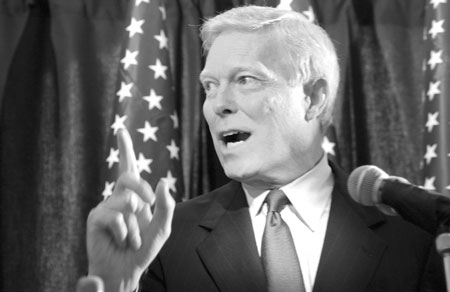By Albert Amateau
Richard Gephardt, Congressmember from Missouri and Democratic candidate for president of the U.S., told the Greenwich Village Chelsea Chamber of Commerce this week about the economic policy issues on which he is running for president.
Gephardt, former majority leader of the House of Representatives, derided President George W. Bush’s proposed tax cut as a “bottomless giveaway to the wealthy,” and proposed instead what he called an “economic security plan” based on strengthening the middle class.
“We have to ask about any economic policy ‘Is it good for the average American working family? Is it fair to the middle class?’” said Gephardt at the Aug. 4 Chamber meeting where he invoked the memory of Senator Robert F. Wagner, who sponsored Depression Era labor laws and was pioneer supporter of health care legislation.
“I look at the American economy from a middle class perspective – building the economy from the middle out,” said Gephardt, whose father drove a milk truck and whose mother worked as a secretary. “I don’t believe in a national economic policy that rewards idle wealth,” he said.
Gephardt spoke at Manhattan Penthouse, 80 Fifth Ave., where the Chamber held its monthly luncheon event on Monday to accommodate an overflow crowd of business and professional members who gave the candidate an enthusiastic reception.
He outlined an economic program that calls for health care for every working family and a single pension plan that follows people wherever they work He said he would also encourage development of renewable energy sources, investment in public transit and an international trade policy that includes labor and environmental standards and protection of intellectual property rights.
“I would repeal Bush’s tax cuts and replace it with a health care plan for all Americans that can never be taken away from them,” he said, adding, “To me it’s a moral imperative.”
Gephardt recalled that his son Matt was diagnosed with cancer when he was two years old and survived because the law firm Gephardt worked for had a health plan. “I remember the terror in the eyes of parents who couldn’t afford that protection,” he said.
Gephardt said his health care plan would benefit local economies because it would help businesses free up funds for investment instead of paying for health insurance. The proposed health plan would also end uncompensated emergency room care. The candidate’s single pension plan would follow workers wherever they went from their first job to retirement.
Gephardt’s economic policy would encourage the development of hybrid cars and renewable energy sources like wind.
An early and ardent supporter of the war in Iraq, Gephardt declined to comment on non-economic aspects of foreign policy.
But he insisted that international trade is beneficial only if it is fair to all countries involved. He recalled he broke with Bill Clinton on the North America Free Trade Act because it did not impose environmental and labor standards on all parties.
“I would press the W.T.O. [World Trade Organization} for an international common wage so we don’t support slave labor and sweat shops around the world,” he said. “We should also raise our own minimum wage so that work always pays more than welfare,” he said, The remark was greeted with a spontaneous applause.
Gephardt dubbed President Bush’s policy as “Houdini economics,” which made a $5.6-million federal surplus and 3 million jobs disappear in three years. “It’s the worst job record of any president since Herbert Hoover,” he said.
The Bush tax cuts for people who earn over $300,000 annually are inevitably offset because state and local governments have to raise property and school taxes to mitigate service reductions, he reasoned.
“We can’t wait 18 months for changes,” Gephardt added. Congress and the president, he said, should increase the national minimum wage now and oppose currency manipulation by foreign countries that inflate the value of the dollar and discourage export of American products.
He also called on Congress to accelerate development of the federal Highway Trust Fund that would finance building roads, bridges and mass transit infrastructure. Tax breaks for companies that export products should be replaced by tax breaks for all manufacturers, Gephardt said.
To help state and local governments maintain infrastructure and hire teachers, Gephardt called for establishment of a federal national development bank.
“In the end, we are all bound together, we are all members of the American family. We have to put the American economic house in order,” Gephardt said.



































